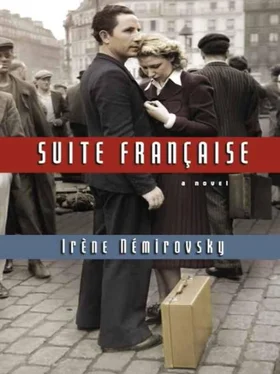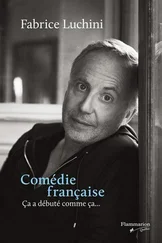Irène Némirovsky - Suite Française
Здесь есть возможность читать онлайн «Irène Némirovsky - Suite Française» весь текст электронной книги совершенно бесплатно (целиком полную версию без сокращений). В некоторых случаях можно слушать аудио, скачать через торрент в формате fb2 и присутствует краткое содержание. Жанр: Историческая проза, на английском языке. Описание произведения, (предисловие) а так же отзывы посетителей доступны на портале библиотеки ЛибКат.
- Название:Suite Française
- Автор:
- Жанр:
- Год:неизвестен
- ISBN:нет данных
- Рейтинг книги:4 / 5. Голосов: 1
-
Избранное:Добавить в избранное
- Отзывы:
-
Ваша оценка:
- 80
- 1
- 2
- 3
- 4
- 5
Suite Française: краткое содержание, описание и аннотация
Предлагаем к чтению аннотацию, описание, краткое содержание или предисловие (зависит от того, что написал сам автор книги «Suite Française»). Если вы не нашли необходимую информацию о книге — напишите в комментариях, мы постараемся отыскать её.
"A book of exceptional literary quality… it has the kind of intimacy found in the diary of Anne Frank."-The Times Literary Supplement
"Heroic… a novel about a nightmare in which the author is entirely embedded."-ANITA BROOKNER, The Spectator
"An exceptionally forceful and frank testimony… a real find. A masterpiece."-L'Express
"Remarkable as the story of the publication of Suite Française is, it will finally be of anecdotal interest compared with the importance of the book. Here is the work of a fine novelist at the top of her form, writing about the fate of her adopted country with a pitiless clarity."-Evening Standard
Suite Française — читать онлайн бесплатно полную книгу (весь текст) целиком
Ниже представлен текст книги, разбитый по страницам. Система сохранения места последней прочитанной страницы, позволяет с удобством читать онлайн бесплатно книгу «Suite Française», без необходимости каждый раз заново искать на чём Вы остановились. Поставьте закладку, и сможете в любой момент перейти на страницу, на которой закончили чтение.
Интервал:
Закладка:
"Oh, so she's your fiancée?" Charlie said while thinking of other things.
"Yes. We were supposed to get married on 14 June. Everything was arranged, the invitations were sent, the rings bought, the dress was supposed to be delivered tomorrow morning." He drifted off into deep thought.
"It's just a delay," Charles Langelet said politely.
"Who knows where we'll be tomorrow, Monsieur? Obviously, I shouldn't complain. At my age I should have been in the army but with my arm… yes, an accident at school… but I think that in this war civilians are facing more dangers than the soldiers. They say that certain towns…" he lowered his voice "… are in ashes and piled high with bodies and there are mass graves. And I've heard some horrifying stories. You know that they've let everyone out of the prisons and insane asylums? Yes, they have, Monsieur. Our leaders have lost their minds. Prisoners are running loose without wardens. I heard that the director of one of these prisons was murdered by the inmates he was ordered to evacuate; it happened right near here. I've seen it with my own eyes: private houses turned upside down, pillaged. And they attack people who are travelling, they steal from people in cars…"
"Oh! They steal from…"
"We'll never know everything that happened during the exodus. Now they're saying, 'You should have stayed at home!' That's nice of them. So we could get massacred in our own homes by the artillery and planes. I'd rented a small house in Montfort-l'Amaury to have a lovely month after our wedding, before going back to my in-laws. It was destroyed on 3 June, Monsieur," he said indignantly.
He talked a lot and feverishly; he looked exhausted. He touched his fiancée's cheek tenderly as she slept. "I just want to save Solange!"
"You're both very young, aren't you?"
"I'm twenty-two and Solange is twenty."
"She's not very comfortable like that," Charles Langelet said suddenly, sweetly, in a voice even he himself didn't recognise, as sweet as sugar, while his heart beat harder and faster. "Why don't you both go and stretch out on the grass, over there?"
"What about the car?"
"Oh, I'll watch the car! Don't worry," Charlie said, trying not to laugh.
The young man still hesitated. "I want to leave as early as possible. And I sleep so soundly…"
"But I'll wake you up. What time do you want to leave? Look, it's nearly midnight," he said, consulting his watch. "I'll call you at four o'clock."
"Oh, Monsieur! You are too kind!"
"Not at all. When I was twenty-two, I was also in love…"
The young man made a confused gesture. "We were supposed to get married on 14 June," he repeated, sighing.
"Yes, of course, of course… we're living through terrible times… but I assure you, it's ridiculous to stay cramped in your car. Your fiancée is all bent up. Do you have a blanket?"
"My fiancée has a big travelling coat."
"It's so nice on the grass. If I didn't have to worry about my rheumatism… Oh, you're so lucky to be a young man of twenty!"
The fiancé corrected him: "Twenty-two."
"You will see better times, you will always find a way out, you will, while a poor old gentleman like me…" He lowered his eyes, like a cat when it purrs. Then he stretched out his hand towards a moonlit clearing just visible between the trees. "It must be so nice over there… you could forget everything." He waited, then whispered in a falsely nonchalant tone of voice, "Can you hear that nightingale?"
The bird had been singing for some time, perched high on a branch, indifferent to the noise, the refugees complaining, the large fires they had lit on the grass to chase away the damp. The bird sang and other nightingales in the countryside answered his song. The young man listened to the bird, tilting his head, and he put his arm round his sleeping fiancée. A few moments later he whispered something in her ear. She opened her eyes. He whispered to her again, closer, urging her. Charlie turned away. Nevertheless, he could hear certain words: "Since this gentleman said he'd watch the car…" And: "You don't love me, Solange, no, you don't… And yet you…"
Charlie yawned loudly, obviously, and, addressing no one in particular with the exaggerated ease of a bad actor, said, "I think I'll go to sleep now…"
Solange stopped hesitating. She giggled nervously, pushing her fiancé away only to give in and kiss him, saying, "If Mummy could see us now! Oh, Bob, you're terrible… you won't hold it against me afterwards, will you, Bob?"
She walked away with her fiancé's arm around her. Charlie saw them beneath the trees, holding each other and exchanging little kisses. Then they disappeared from sight.
He waited. The half-hour that followed seemed the longest of his life. But he was determined. He felt both anguish and extraordinary pleasure at the same time. His heart beat so violently, so painfully that he muttered, "This heart of mine… can't take it!"
But he knew he had never felt such exquisite pleasure. A cat who sleeps on velvet cushions and is fed on chicken breasts and suddenly finds himself in the middle of the countryside, on the dry branch of a tree wet with dew, sinking his teeth into a trembling, bleeding bird, must feel the same terror, the same cruel joy, he thought, for he was too intelligent not to understand what was happening to him. Quietly, ever so quietly, taking great care not to make any noise with the doors, he climbed into the car next to his, untied the petrol cans (he also took some oil), cut his hands getting the cap off his tank, poured in the petrol and, taking advantage of a moment when several other cars started their motors, drove off.
Once out of the forest, he turned round, smiled up at the trees, silvery green beneath the moon, and thought, "They will indeed have been married on 14 June after all…"
23
The uproar in the streets woke the elder Monsieur Péricand. He opened one pale eye, just one, in confusion and reproach. "What on earth are they shouting about?" he thought. He had forgotten the journey, the Germans, the war. He thought he was at his son's home in Boulevard Delessert, even though he was staring at a strange room; he didn't understand a thing. He was at an age when the past was more real than the present; he pictured the green cover on his bed in Paris. He stretched his shaking fingers towards the bedside table where, every morning, some attentive person would put out a tray with porridge and his special biscuits. There was no tray, no bowl, not even a table. It was then that he heard the fire roaring in the neighbouring houses, smelled the smoke and guessed what was happening. He opened his mouth, gasped silently, like a fish out of water, and fainted.
Yet the house hadn't burned to the ground. Only a part of the roof had been destroyed. After a great deal of panic and chaos, the flames died down. Amid the wreckage, the fire smouldered and sizzled quietly, but the house was intact and towards evening they discovered the elder Monsieur Péricand, alone in his bed. He was muttering, confused. He calmly let them take him to the nursing home.
"He'll be better off there. I've got no time to take care of him. Imagine the idea," said the owner, "what with the refugees, the Germans about to march in and the fire and all…"
But she said nothing about what was worrying her most: her husband and two sons, gone, all three called up and missing… All three away in that vaguely defined, ever-changing, terrifyingly imminent place called "the war"…
The nursing home was very clean, very well looked after by the Sisters of the Sacred Sacrament. They put Monsieur Péricand in a bed next to a window; he would be able to see the tall green June trees outside and the fifteen old people around him, silent and calm in their white sheets. But he saw nothing. He thought he was still at home. Now and again he seemed to talk to his weak purplish hands, folded on top of the grey blanket. He would utter a few harsh, broken words to them, then slowly shake his head and, out of breath, close his eyes. The flames hadn't touched him, he hadn't been wounded, but he had a very high fever. The doctor was in the next village, tending to the victims of the bombing. Late that evening he was finally able to examine Monsieur Péricand. He didn't say much: he was staggering with exhaustion, he had cared for sixty wounded and hadn't slept in forty-eight hours. He gave him an injection and promised to come back the next day. To the Sisters there was no question: they had enough experience with the dying to recognise death by a sigh, a whimper, drops of cold sweat, motionless fingers. They sent someone to get the priest who had been with the doctor in town and hadn't slept either. He gave Monsieur Péricand the last rites and the old man seemed to come round. As he left, the priest told the Sisters that the poor old gentleman had made his peace with God and would die a very Christian death.
Читать дальшеИнтервал:
Закладка:
Похожие книги на «Suite Française»
Представляем Вашему вниманию похожие книги на «Suite Française» списком для выбора. Мы отобрали схожую по названию и смыслу литературу в надежде предоставить читателям больше вариантов отыскать новые, интересные, ещё непрочитанные произведения.
Обсуждение, отзывы о книге «Suite Française» и просто собственные мнения читателей. Оставьте ваши комментарии, напишите, что Вы думаете о произведении, его смысле или главных героях. Укажите что конкретно понравилось, а что нет, и почему Вы так считаете.

![Константин Бальмонт - Константин Бальмонт и поэзия французского языка/Konstantin Balmont et la poésie de langue française [билингва ru-fr]](/books/60875/konstantin-balmont-konstantin-balmont-i-poeziya-francuzskogo-yazyka-konstantin-balmont-et-thumb.webp)










